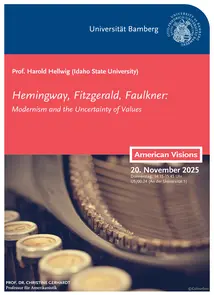Prof. Harold Hellwig (Idaho State University): “Hemingway, Fitzgerald, Faulkner: Modernism and the Uncertainty of Values”
Thursday, November 20, 2025, 2:15 - 3:45 p.m., U5/00.24 (An der Universität 5)
The modernist novels of Hemingway, Fitzgerald, and Faulkner all focus on the question of identity in the twentieth century as expatriates to their own American culture. Hemingway responded to his Italian war experience, Fitzgerald to the idea of capitalism in his time, and Faulkner to his growing disenchantment with the Southern Gothic. An expatriate (for the American) is someone who disavows a native culture in favor of something new. Yet only Hemingway found his identity as an expatriate; the other two writing from an American perspective and not really responding to their European experiences. Though all three writers do not show the same sense of recovery from chaos and disorder that one usually finds in American literature before 1920 (for example, the social order remains somehow intact after the conflicts in Nathaniel Hawthorne’s The Scarlet Letter, 1850, or The Marble Faun, 1860). They do not replicate the genteel world of William Dean Howells. At the same time, all three describe an America devoid of values that might serve as forms of salvation from an uncertain, modern world.
Their different writing styles show their experimental approaches to the uncertainties that their characters face: Hemingway’s terse and emotionless prose in A Farewell to Arms (1929), Fitzgerald symbolic version of realism in The Great Gatsby (1925), and Faulkner’s pseudo stream of consciousness in The Sound and the Fury (1929). These are very different novels, but they all suggest the lapses of value that the American vision suggested before the twentieth century. Penelope Vita-Finzi writes about an earlier expatriate who returned to American themes: “Edith Wharton’s fiction about the artist from 1899 until the end of her life explores … the struggle between individual will and social codes; the need to balance the inner world of the imagination with the actual world; the obligation to have absolute standards of taste in social groups swayed by fashion; the necessity for order in private lives which requires compromise” (Edith Wharton and the Art of Fiction, 126.). Hemingway, Fitzgerald, and Faulkner, by contrast, struggled with having any “standards of taste” in worlds devoid of meaning, rendering their concepts of identity uncertain and their values adrift.
The talk will review themes of sexual identity, personal identity, the disintegration of moral stability, and also the trauma of war (Hemingway), the trauma of family (Faulkner), and the trauma of broken codes (Fitzgerald) in relation to modernism’s experimental modes of narrative.
Professor of English, HAROLD HELLWIG has taught at Idaho State University for many years. He published a book on Twain’s travel works, and more recently a book on American film noir in 2023. He is an expert in the fields of rhetoric and composition, with publications in those areas, and with administrative experience as the Director of Composition. He is currently researching the influence of Italian culture on American writers who traveled to and lived in Italy, primarily Venice. He is extending that work to the influence of Catholicism in Europe, primarily southern Germany.
